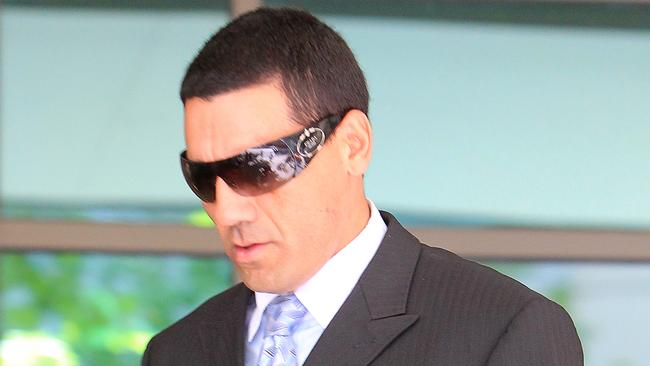Rita Panahi: Courts are sending the wrong message
ONE woman suffered a blowtorch attack so severe she lost her finger, but her abuser got six months. Our courts are sending a “why bother” message to violence victims, writes Rita Panahi, but the urgent need to change is lost on the judicial system.
Rita Panahi
Don't miss out on the headlines from Rita Panahi. Followed categories will be added to My News.
THE scourge of domestic violence continues to destroy lives around the country despite the enormous focus and funding that has been devoted to ending this often deadly malaise.
On average, one woman a week is murdered by a current or former partner. This month the toll is much higher with a number of women killed across the country from Ballarat to Palmerston.
Then there are the thousands of women who are long-term victims of violence; most suffer in silence in abusive relationships, never making a formal complaint, while others bravely subject themselves to the justice system only to be let down all over again.
OCTOBER HAS BEEN HELL FOR AUSTRALIAN WOMEN
SHANNAN THOMAS LAUNCHES DOMESTIC VIOLENCE CAMPAIGN
55 WOMEN KILLED THIS YEAR IN SUSPECTED DOMESTIC VIOLENCE
It is demoralising for victims of violence to see cases that are successfully prosecuted in the courts result in the abuser walking away with a pitifully inadequate punishment.
The message sent to victims is, why bother? Why go through the harrowing process to see your abuser get what amounts to a slap on the wrist with a wet lettuce leaf.
Mostly these cases go unreported but in the past couple of years there have been a number of high-profile cases involving former sportsmen that have hit the headlines. There was former Port Adelaide and Carlton player Nick Stevens, who was sentenced to eight months for terrorising and repeatedly bashing his former partner, Laima McKenna. He appealed and, to the disgust of domestic violence groups, the sentence was reduced to six months, with three months suspended.

Last year, former Carlton, Richmond, Geelong and Essendon player Justin Murphy, who had a criminal record, was sentenced to a pitifully lenient six-month term for a campaign of harassment, stalking and threats against his former partner Jill Scott — culminating in a blowtorch attack in which the victim suffered burns so severe that she lost a finger.
Six months for physically and psychologically scarring a woman seems an utterly absurd penalty.
The latest case involves former North Melbourne great Shannon Grant who somehow escaped with a $1200 fine from a Queensland court after assaulting his former partner, Shannan Thomas.
Grant was already on a two-year Community Corrections Order that was imposed after he successfully appealed against a six-month jail term over three separate attacks against Thomas, including picking her up and throwing her against a fence, throwing a beer bottle at her head, choking her and stamping on her bare foot and dragging her by the hair across the floor. Despite pleading guilty to seven charges, including counts of unlawful assault, Grant’s six-month jail term was set aside with County Court judge Susan Cohen noting the “shame inflicted” due to the publicity surrounding the case.
“You otherwise have been functioning as a responsible member of the community engaged in employment until that ceased as a result of these charges,” she said. “The publicity in relation to your offending and appearance before court has resulted in what your counsel called extra-curial punishment.”
Late last week Grant’s behaviour was again being scrutinised in a courtroom, this time in Maroochydore, where he pleaded guilty to breaching a domestic violence order after twice attacking Thomas at a pub.

MAGISTRATE Rod Madsen imposed a fine despite Grant’s record and refusal to co-operate with police. His victim has launched a Red Flags campaign to help other women recognise the signs of abuse.
“I’m seeing it every day, the effects of domestic violence: how it impacts on people’s lives long-term. And the experience I have been through showed me there is a need for more prevention and intervention,” Thomas said. “It usually starts with the manipulation and emotional abuse, before moving to the physical abuse. But by then you can be left feeling trapped in the abusive web.”
There has been so much said, written and studied about domestic violence. We have programs in school and national advertising campaigns aimed at boys and unhealthy attitudes to women.
Bad jokes and gendered toys are conflated with violence against women. But when there are cases of abuse before the courts, too often the penalties fall well short of community expectations.
It sends a terrible message to women in abusive relationships and those who have escaped; it tells them to not bother with the court system. Domestic Violence Victoria CEO Fiona McCormack warns that all institutions must treat “family violence seriously and hold perpetrators responsible”.

“It’s critically important that women who are living with family violence have confidence that the justice system will keep them safe and hold perpetrators of family violence to account,” she said.
There are a number of reasons why women stay in abusive relationships even after the intervention of authorities.
Along with the emotional trauma at the heart of battered women’s syndrome there are also practical reasons why many women feel trapped and chief among them is financial hardship.
There is help available but women caught in the cycle of violence are often ill-equipped to access it. Founder of women’s homelessness charity White Caravan, Juliet Potter, helps women learn what they can access and make contact with services, government and charitable, so they do not become homeless or are reduced to couch-surfing.
As a community we have rightly made tackling domestic violence a priority and it’s time for the courts to do their part in handing out appropriate sentences to those guilty of violence against women.
There have been more than 60 women killed so far this year, the majority at the hands of a current or former partner. That is a statistic that no Australian should accept.
Rita Panahi is a Herald Sun columnist


